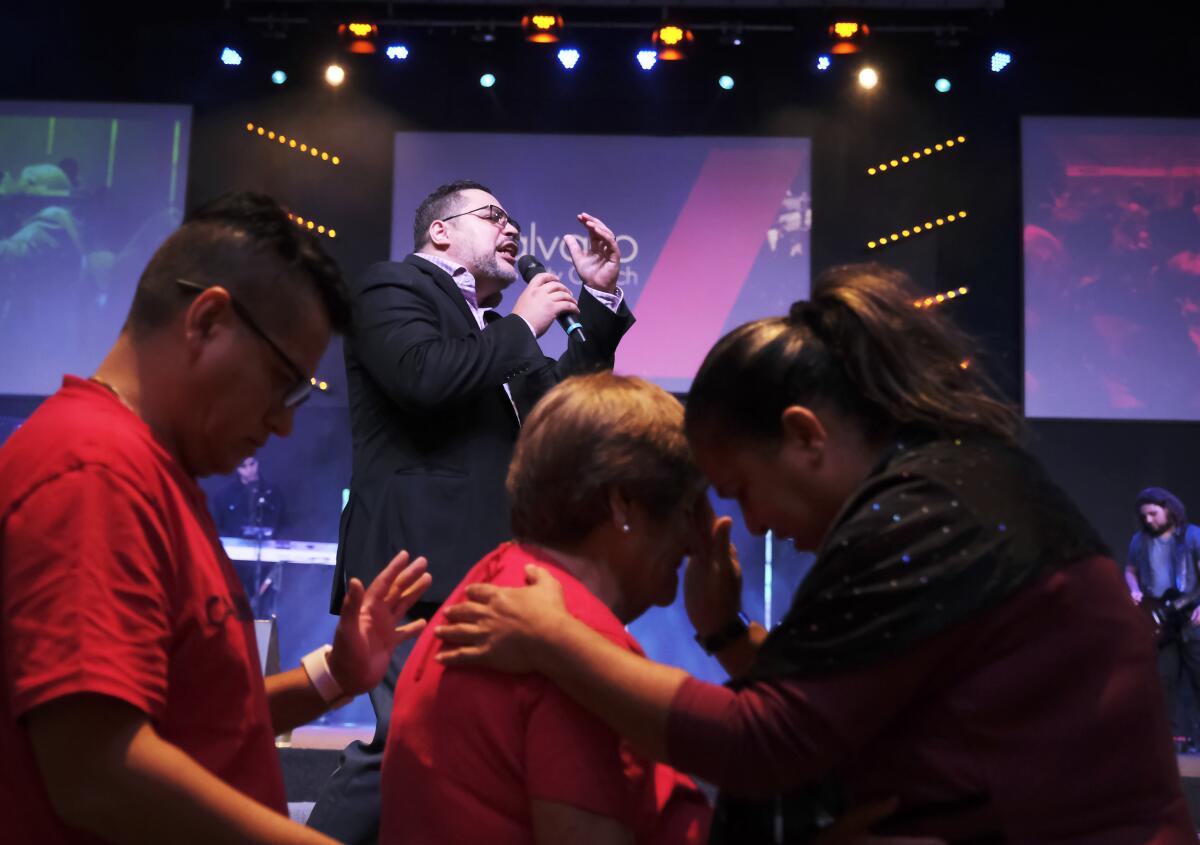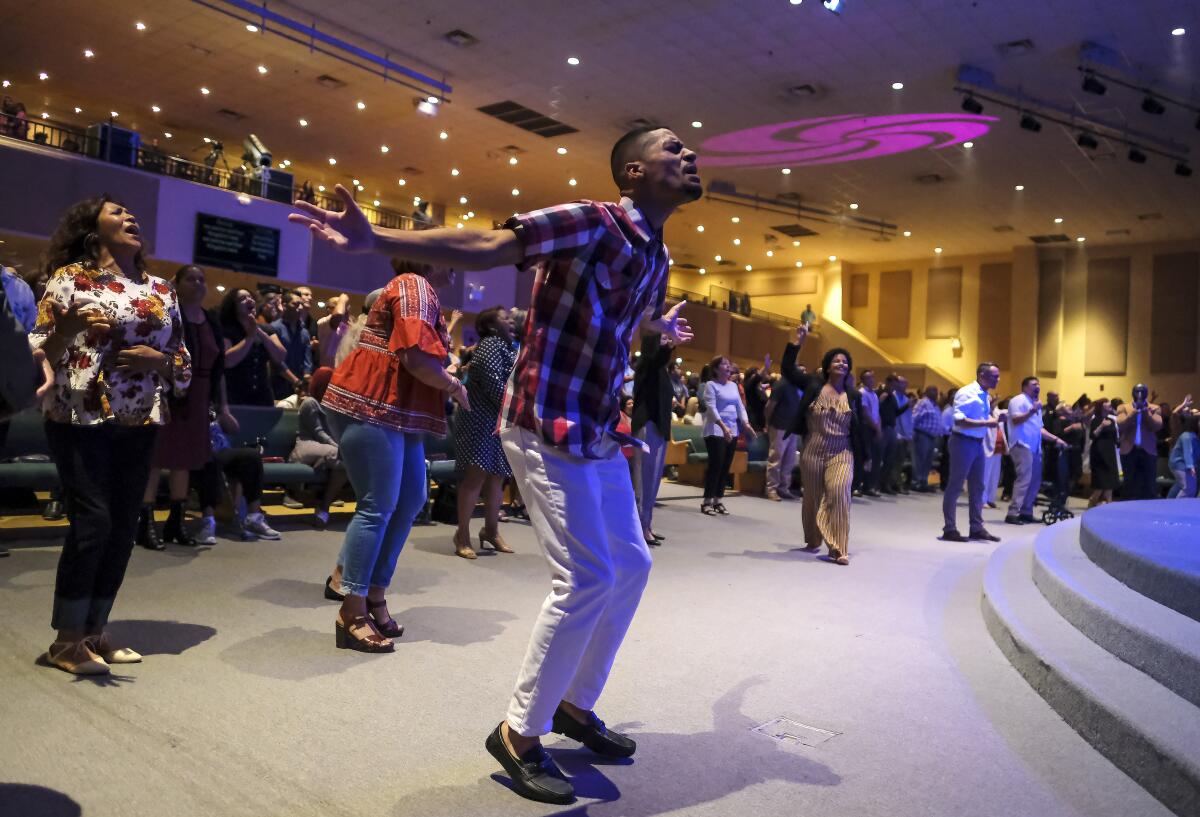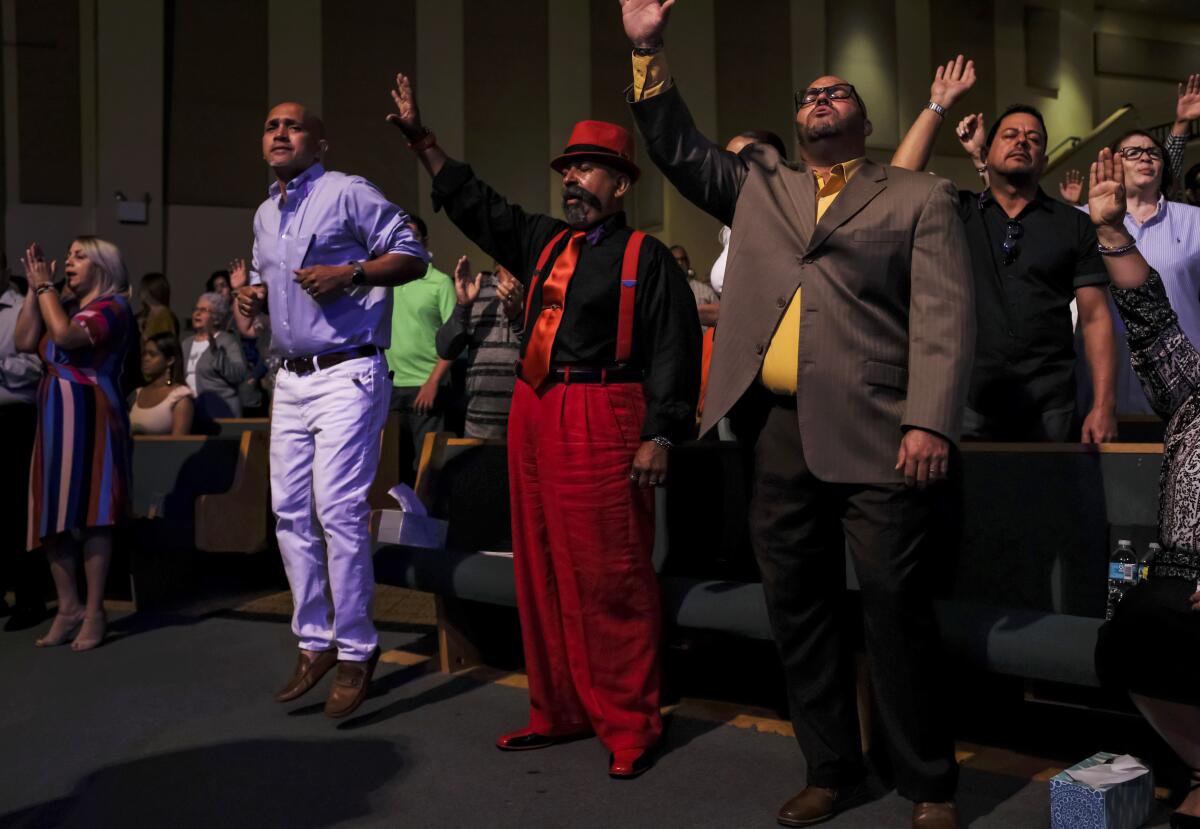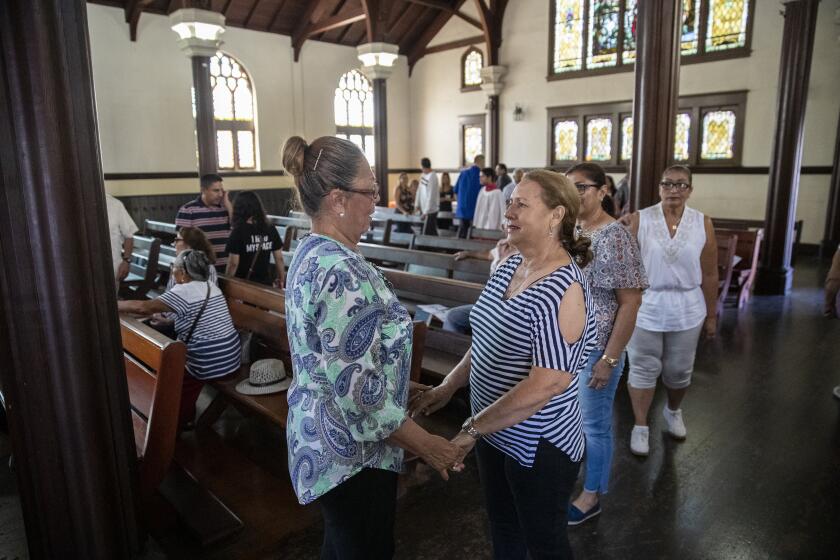Latino evangelical voters face a tug of war in the Trump era

ORLANDO, Fla. — The Rev. Gabriel Salguero paced the stage, his voice booming into a microphone as 3,000 faces tipped toward him.
He spoke in Spanish of how Latinos came to the U.S. to escape political corruption. His wife, the Rev. Jeanette Salguero, picked up the thread in English: Immigrants came here to escape natural disasters, hunger, violence, she told the congregants of Calvario City Church.
“God brought us here,” Jeanette thundered, “to be a blessing.”
“Our people, our immigrants, our refugees, deserve to be respected now,” the evangelical pastors declared in turn, as the crowd’s rumbling of assent grew.
The plight of immigrants and refugees resonates deeply with Calvario’s mainly Latino congregation. The New Testament, particularly Jesus welcoming the stranger, has taken on a new political significance in the Trump era.
Many at Calvario and elsewhere are disturbed by President Trump’s restrictive immigration policies, reductions in the number of refugees allowed into the U.S. and his divisive and sometimes racist rhetoric about people of color. But when Latino evangelicals go to the ballot box, they also consider their positions on abortion, gay marriage and criminal justice.
“Because we’re evangelical, people assume we’re Republican, and because we’re Latino, people assume we’re Democrats,” said Gabriel Salguero, who is Puerto Rican.
White evangelicals, whose numbers are declining, have long been a reliable voting bloc for Republicans, and a large majority continue to support Trump. Black evangelicals have historically leaned Democratic. But among Latino evangelicals, who often identify as politically independent, support for the parties, and for Trump, is more ambiguous.
Latinos are expected to make up the largest minority voting bloc for the first time in 2020 and could play a key role in the presidential election. A majority tends to vote Democratic, but Latino evangelicals — a growing group now at 2% of the national population — tend to be more conservative than their nonreligious and Catholic counterparts.

In Florida, Republicans have long tapped into religious communities for presidential elections, said Fernand Amandi, a political strategist based in Miami. But this year, Amandi said, Latino evangelical voters conflicted over Trump are up for grabs.
“I think there is an opportunity there now for the Democrats to come in and basically make the case that not only is this the most impious man on the planet, he’s also the most anti-Hispanic president in U.S. history,” he said.
The Salgueros preach religious harmony and at times openly advocate for social justice policy in sermons at their church nestled along Florida’s Interstate 4 corridor, but they urge congregants to remain immune to partisan politics. They do not endorse political parties or candidates.
“At the end of the day you’ve got to make a decision, but at least it’s not blind allegiance or blind endorsement,” said Salguero, who served on advisory councils for former Presidents Obama and George W. Bush. “You make tough choices. You pray, you deliberate.”
It has not been easy. Trump advocates for religious freedoms and appointed two Supreme Court justices who are like-minded on issues like abortion, just as some Latino evangelicals had hoped. But his treatment of asylum seekers and others and his behavior in general, make some at Calvario say there’s no chance they will vote for him.
Isael López says Trump is arrogant and “not a genuine person.” But like many others in the congregation, López said that does not necessarily mean he will support a Democrat.
The graphic designer said he voted for a third-party candidate in 2016. Now he’s waiting to see who more closely represents his faith-based views, Democrat or not, saying, “For now, I’m holding my vote.”
Celeste Marzan, 49, a volunteer at the church, said Trump’s behavior is inconsistent with the Christian values he proclaims. When she thinks about the way he treats women, the accountant said, “It makes me gag.”
Marzan said she did not vote in 2016 because she couldn’t stand either candidate. She could support a Democrat in 2020 — if the candidate fears God and respects others, especially the vulnerable, she said.

Democrats haven’t done enough to show evangelicals that a majority of the party’s platform — including healthcare for all and expanding federal programs to help those in need — aligns with their values, said Bishop Joshua Rodriguez, a founding pastor of a church in Jersey City, N.J.
“We believe in pro-life, but from the womb to the tomb,” said Rodriguez, who was in Orlando for a summit hosted by the National Latino Evangelical Coalition, founded by the Salgueros.
Rodriguez doesn’t like to see evangelicals painted broadly as supporting Trump’s policies, and wants Democrats and evangelical leaders to collaborate on issues both groups champion.
Evangelicals of all races are more socially conservative than their nonreligious counterparts, but there are divisions along racial lines on political issues, according to a 2016 national study by University of Maryland professor Janelle Wong.
Church leaders struggle to provide comfort and hope to Latino congregations in Trump era
Half of white evangelicals agree with the statement “immigrants hurt the economy,” compared with 25% of Latino evangelicals, the study found. “For Latino evangelicals, their community identity is much broader than just evangelicals,” Wong said.
Mike Madrid, a Latino Republican consultant based in California, said the president’s strategy to run a race-based campaign will only split the evangelical electorate.
“Because of the overt anti-Latino policies that are coming out daily from the president and the Republican Party, you are forcing the Latino population to choose between their racial identity and their religious beliefs,” he said.
But Rev. Samuel Rodriguez, a well-known evangelical pastor who delivered a prayer at Trump’s inauguration, said Democrats’ stances on abortion will likely keep Latino evangelicals away from the polls.
“If they can’t support Trump,” he said, “they’re probably gonna stay home.”
For Jonathan Rivera, a pastor at Calvario, that’s not an option. He was conflicted about whom to vote for during the 2016 presidential election. So he didn’t cast a ballot.
“I regretted it immediately after and I felt, if anything, once President Trump came into office, I felt even more responsible,” said Rivera. “I felt like my silence was complicit in his election.”
Rivera, 27, said he’s a Christian first and Latino second. The dual identities aren’t a balance but a tension, because policy issues directly impact people in his church and their families, he said.
“And tensions aren’t balanced, they’re managed,” said Rivera, a registered independent. “And so you do the best that you can with it.”
With Trump’s rhetoric proving harmful to his community, Rivera said he believes he’s not alone in realizing he cannot afford to sit out this election.
“I think a lot of Latino evangelicals believe that we don’t have a candidate, but we have to do better than President Trump,” he said. “I don’t think that means Republican or Democrat. I just think that means better.”
Gabriel Salguero says Latino evangelicals are never a given for one party because they take their political cues from scripture, not party ideology.
“The very American temptation is to co-opt religion,” Salguero said, but “God is not a Republican and God is not a Democrat.”
More to Read
Get the L.A. Times Politics newsletter
Deeply reported insights into legislation, politics and policy from Sacramento, Washington and beyond. In your inbox three times per week.
You may occasionally receive promotional content from the Los Angeles Times.












